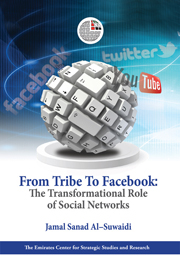Book contents
- Frontmatter
- Contents
- Acknowledgments
- Introduction
- Keywords
- Scope of the Study
- Previous Studies
- Social Networks: Concept and Role
- Statistical Indicators of Main Social Networks
- The Social Networking Age
- Data-entry Potential of Social Networks
- Impact of Social Networks
- Prospects for the Relationship between Traditional Media and Social Networks
- Legal Problems Associated with the Use of Social Networks
- Social Networks: Future Prospects
- Conclusion: Various Future Prospects
- Notes
- Bibliography
- Index
Impact of Social Networks
Published online by Cambridge University Press: 05 September 2014
- Frontmatter
- Contents
- Acknowledgments
- Introduction
- Keywords
- Scope of the Study
- Previous Studies
- Social Networks: Concept and Role
- Statistical Indicators of Main Social Networks
- The Social Networking Age
- Data-entry Potential of Social Networks
- Impact of Social Networks
- Prospects for the Relationship between Traditional Media and Social Networks
- Legal Problems Associated with the Use of Social Networks
- Social Networks: Future Prospects
- Conclusion: Various Future Prospects
- Notes
- Bibliography
- Index
Summary
The focus here is to monitor the effects of social networks on various aspects of life, with a view to assessing their importance and limits of influence in directing public and user opinion among different age groups.
Political Effects of Social Networks
The Internet could prove to be a force of change more effective than all other media forms, although this is some way in the future considering the relatively limited access to the Internet found in most Middle East countries in particular. Such an interactive network would create an intellectual environment that could open the way to political change due to the capability of the Internet to generate political pressure through its democratic nature and ability to attract popular participation. There are no constraints or limits on freedom of expression on the Internet and putting forward political views via social networks can encourage an enormous number of followers to adopt them. This could drive governments to change their policies in response to the demands of public opinion. Therefore, advocates of political change need not take the risk of actually taking part in protests, instead they can create significant ‘virtual’ political pressure through social networks where obtaining information and disseminating it without censorship represents an ‘information democracy.’
Since freedom is available to all regardless of their intent, violation of this freedom by any party remains a possibility. If online social networks played a major role in igniting the angry protests that eventually led to political change in countries like Egypt and Tunisia, then those that are accessible through communication devices such as smartphones have proven exceptionally effective in mobilizing activists via online social networks – especially Twitter and Facebook – to organize protests, both virtual and physical.
- Type
- Chapter
- Information
- From Tribe to FacebookThe Transformational Role of Social Media, pp. 50 - 99Publisher: Emirates Center for Strategic Studies and ResearchPrint publication year: 2013



